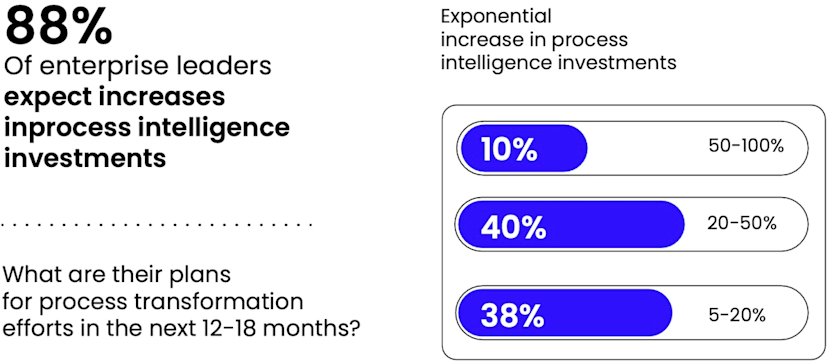
Process intelligence is the top emerging tech investment for enabling process transformation
Facing the challenges of market volatility and supply chain disruptions, businesses are turning to process intelligence for greater operations visibility and efficiency. That is one of the key findings from a study conducted by HFS Research and commissioned by Celonis and IBM Consulting.
According to the July 2023 report, “Infusing Intelligence and Predictability with Digital Process Twins,” nearly 90% of enterprise leaders said supply chain disruption has a high impact on their industry, and 77% said the same about inflation and recessionary market conditions. “Supply chain disruption and material availability is the biggest challenge in the market,” said Anastasiia Glebova, Global process mining leader, Kone Cranes.
To address these challenges, organizations often turn to ERP modernization, but as the report points out, ERP isn’t a silver bullet. Only 36% of survey respondents strongly agreed that ERP can “solve most of our process problems.” The authors believe that “designing and running superior business processes will require enterprises to address their process debt,” which only 31% of survey respondents strongly believe their organizations do not have. Similar to “technical debt,” HFS defines process debt as the “awkward and often manual processes” designed to support aging technologies.
“While migrating to cloud-based ERP certainly has a role to play in operations modernization, enterprises must revisit the design and execution of their processes to have a bigger impact,” said Reetika Fleming, Executive Researcher Leader at HFS Research, in a press release. “Our study with Celonis and IBM Consulting finds that many organizations are turning to process mining as the primary way to tackle these challenges. The majority of enterprises have already gotten their feet wet with initial projects and the research shows the high potential for this set of technologies to rapidly drive radically new sources of insight and business value.”
Process intelligence: #1 emerging tech investment expected to impact process transformation
According to the study, enterprises are turning to process intelligence for greater operations visibility and efficiency so they can tackle today’s macro economic challenges. Of the 260 enterprise leaders surveyed, 54% said efficiency and productivity were the biggest benefits they sought through process transformation initiatives in the past year, and 42% said the same of operating cost reduction.

Eighty-eight percent (88%) expect increases in process intelligence investments despite the harsh economic climate. “In challenging times, large enterprises are doubling down on productivity gains across their operation,” the authors wrote.
Digital process twins: Real-time visibility for end-to-end operations
The study also found that organizations are combining process intelligence and digital process twins (also called process digital twins or just digital twins) for greater impact. Digital process twins blend multiple datasets to provide multi-process and multi-function visibility. They allow business leaders to better plan for future impacts on business processes through scenario modeling and planning, stress testing and simulations.
“Harnessing the power of process intelligence by creating digital process twins allows our clients to have real-time visibility into cross-functional processes, helping our BPO team to deliver efficiency, effectiveness, and experience for all stakeholders in the business process,” said Neeraj Manik, Americas BPO and Growth Leader, IBM.
More than 95% of respondents see combining visibility into cross-functional operational performance and monitoring as a game-changer, and 63% expect to link process insights as a fully operational digital command center in the next one to three years.
Additionally, advances in process mining technology, such as object-centric process mining (OCPM) and the use of generative-AI, are making digital process twins more powerful and accessible. Celonis Process Sphere, which is powered by OCPM, enables businesses to visualize and analyze the complex relationships between objects and events across interconnected processes. Celonis LLM for PQL Generation combines process intelligence and generative AI to enable everyone in the business to analyze and optimize processes.
“Process mining provides unparalleled visibility into how a business runs, uncovering value opportunities hidden by complexity within and across processes,” said Wil van der Aalst, Chief Scientist, Celonis. “With Celonis, teams can analyze multiple processes simultaneously and create a digital twin of their organization. These digital twins can be used to enable quick wins, advanced simulation, and expert decision-making,” he added.
Get report


